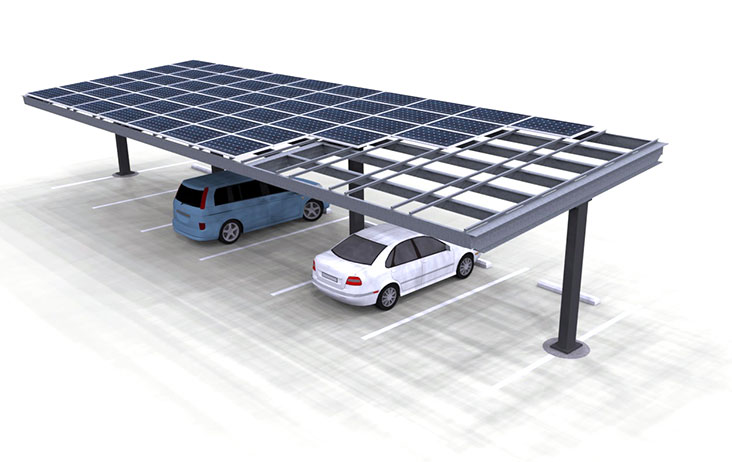
A solar carport is a photon-capturing canopy covering a parking area. While they have some things in common with traditional carports and ground-mounted solar arrays, solar carports have distinct advantages over both.
Any PV contractors looking to expand their reach and grow their operations should consider adding solar carports to their list of installation services. The market is already huge. And with PV panel prices trending downwards and electric vehicle (EV) sales on the rise, demand for solar carports will only increase in the years to come.
This article explains what solar carports are, how they work and why they’re becoming more popular.

A solar carport is a covered parking area with a canopy made from PV panels. Sometimes these carports are designed for a single parking spot – like in residential driveways. Other times, they might be strung together in a series to cover entire commercial parking lots.
Either way, solar carport owners benefit from cheaper and cleaner electricity, while also providing shade and protection for their vehicles.
Unlike with traditional PV installations attached to rooftops, ground-mounted PV systems rely on tilted panels installed several feet off the ground.
Solar carport structures use a ground-mounted model – except that the PV panels are installed even higher off the ground to provide enough clearance for parked vehicles. Many solar carports also come with in-built electric vehicle (EV) charging stations so that drivers can top up their batteries when not using their cars.
A standard solar carport system costs about $3.45 per watt, with the bulk of these expenses going to:
While these are rough averages, there are several different factors that might influence the total cost of a solar panel carport. For example, commercial installations tend to be somewhat cheaper per watt due to economies of scale. With current PV panel prices, for example, a business owner should budget closer to $3.45 per watt. By contrast, residential solar carports hover closer to the $4 per watt range on average.
Either way, solar carports are technically more expensive than their rooftop counterparts are, with a traditional residential PV system costing as little as $2.81 per watt to install. However, not every home or commercial property is suited for rooftop solar due to any number of factors, including:
For those with large enough yards, ground-mounted solar is often an attractive option, with prices hovering in the $3.11 per watt range.
Despite their higher costs, however, solar panel carports provide a host of advantages over rooftop and ground-mounted PV systems.
Below are just some of the reasons commercial and residential solar carports are increasingly in demand.
Solar canopies represent an easy way to turn unused surface areas into mini power plants. Just as with rooftop and ground-mounted solar installations, clients can generate their own clean electricity on-site instead of buying power from the utility company. As a result, solar carport owners benefit from monthly savings – not to mention smaller carbon footprints. Better still, their energy costs stay constant since sunshine remains the same price forever (free).
With enough installed capacity, users can even sell excess solar energy back to their utility providers under incentive programs like net energy metering.
Ground-mounted solar installations take up valuable real estate, with the space underneath not providing much benefit. Similarly, the average parking lot isn’t terribly productive (even when cars are parked there).
Solar carports offer the best of both worlds – allowing users to optimize limited real estate by transforming unproductive parking spots into renewable energy-generation machines.
In addition to generating cheaper and cleaner electricity for their owners, solar carports also provide protection from the elements:
This is a relatively recent benefit. But solar carports can be integrated with EV-charging solutions:
Although solar carports carry a higher price tag, they are simpler to manipulate and optimize than traditional rooftop PV systems. It’s much easier to reorient a parking spot than it is to reposition an entire roof. And this allows installers to orient their clients’ carports in the optimal direction to maximize sun capture – and by extension, solar power generation, carbon offsets, and monthly savings.
Solar carports aren’t for everyone. And your own clients may be better off with a conventional rooftop solar installation, provided their home or business has sufficient space and the right orientation.
However, solar carports are an increasingly affordable option that delivers many important benefits. And with demand on the rise, adding solar carports to your renewable energy services is a great way to attract more business and future-proof your operations.